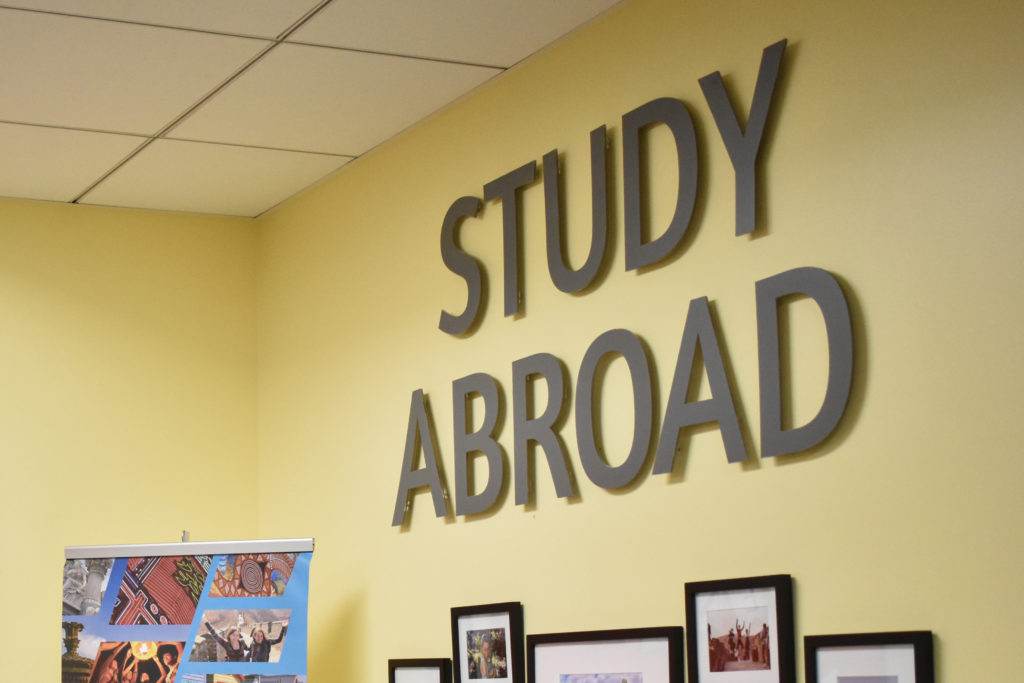Study abroad officials will offer a virtual exchange program for incoming international students this spring.
Jennifer Donaghue, the director of the International Services Office, said international exchange students will connect with domestic GW students through virtual classes and programming to replicate the experience of an in-person program. She said the program is designed for exchange students who can no longer study abroad in the spring due to travel restrictions during the COVID-19 pandemic.
Donaghue said students who participate in the program will not be charged any additional fees, and officials have yet to finalize the number of students who can participate in the program. She said students involved with the program will attend a virtual orientation but declined to elaborate what virtual programming students will participate in.
“Students will be able to experience the excellent academics GW offers and have an opportunity to engage with domestic GW students in the virtual academic setting,” Donaghue said in an email.
Officials canceled all study abroad programs and non-essential travel this academic year in light of travel restrictions during the pandemic.
Of GW’s 12 peer schools, the universities of Rochester and Pittsburgh and Northeastern University have created similar virtual alternatives for their study abroad programs.
Study abroad officials at other universities said even though virtual exchange programs can replicate certain aspects of in-person study abroad, like being able to take classes in English, it’s hard to recreate the cultural experience of living in the United States for a semester.
Nick Gozik, the director of the Office of International Programs at Boston College, said online international programs like GW’s program are not new, and universities have used “Collaborative Online International Learning” projects, a style of teaching in which two faculty members at different universities around the world teach a joint virtual class, for many years even prior to the pandemic.
“One significant benefit of online learning is that it can help to broaden the reach of international exposure to students who may not have the ability or interest in going abroad,” he said in an email.
Gozik said GW’s virtual exchange program can be beneficial for international students who can’t travel to the United States due to immigration and travel restrictions.
But he said GW’s program can’t “fully” replace in-person exchange experiences because many students learn outside the classroom, through interactions with people on the street or learning how to navigate public transportation in a foreign country.
“Much is learned outside of the classroom, whether it be in the street, in public transportation or in host family, and it is not possible to entirely replicate this level and type of exposure to cultural differences in an online format,” he said.
Devika Milner, the assistant dean and director of study abroad at the University of Miami, said students may struggle with virtual learning without being able to get to know their professors face-to-face.
“Sometimes it’s easier for students to understand professors if they’re face to face than on the computer because of the possibility of technological issues,” Milner said. “There are students who are less inclined to do a virtual exchange because they feel it’s not a substitute for living and studying abroad.”
She said officials at the University of Miami sent a survey to students at the beginning of the pandemic to gauge student interest in a virtual study abroad program but decided against implementing one after receiving a “strong, negative reaction.”
“We are, however, looking to have some of our study abroad partners do a short-term, virtual leadership development certificate program for our students,” Milner said. “I’m not calling it a substitute for study abroad, but it’s something that students can participate in and learn cross-cultural skills.”
Milner said the online virtual exchange program could still be an opportunity for exchange students who are looking to enhance their own language skills.
“If they’re looking to really get better at learning English, for example, then this is the perfect opportunity to do so,” Milner said. “They could also take advantage of the virtual events such as conferences and webinars.”
Bill Burress, the director of study abroad at Elon University in North Carolina, said officials at Elon have not looked into designing virtual replacements for their in-person study abroad programs because students haven’t indicated an interest in it.
“I’m less convinced of programs that are simply virtual classrooms with instructors that are overseas or elsewhere, coming in to students in their living room, because I guess I’m just not sure how much value that adds relative to virtual classrooms in life at your own university,” he said.
Burress said exchange programs should be “well-designed” to include both traditional academic courses and a “cultural assessment course,” which can teach students about American culture since they won’t be able to experience it in person.
“Just generally, I think our response to the coronavirus, for instance, would be a really interesting topic for a course on American culture because in some ways it’s similar to many countries and a lot of ways it’s different,” Burress said. “You can learn a lot about the United States just from observing that.”








